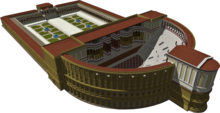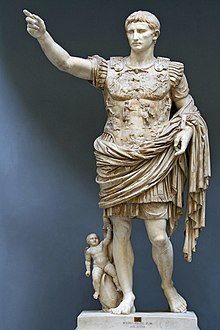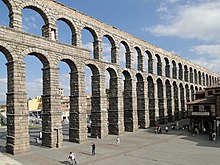Wikipedia:Wikipedia Signpost/2013-05-20/WikiProject report
Appearance
WikiProject report
Classical Greece and Rome










This week, we traveled back in time to WikiProject Classical Greece and Rome. The project started in May 2006 and became the home of 37 Featured Articles, 5 A-class Articles, and 87 Good Articles. Members work on a to-do list, maintain a variety of templates, subscribe to Article Alerts, and keep an eye on a project watchlist. We interviewed davidiad, Cynwolfe, Andrew Dalby, and Amadscientist.
- What motivated you to join WikiProject Classical Greece and Rome? Do you tend to focus on one of the two cultures? Have you ever visited historic sites in the modern countries that ultimately succeeded these ancient societies?
- davidiad: Nothing fancy: on the first talk page I edited I saw the Project's banner and joined, probably because I'm a member of similar groups in real life and just figured that, if I were going to edit in classics on Wikipedia, I should be a member of such a group here so that I could coordinate with other classically minded editors.
- Most of my work is in Greek poetry, especially archaic Greek epic, and mythology, but I also occasionally do some triage on Roman writers.
- I've never had any great interest in the local realia of antiquity, but I would like to visit Aetolia in the future. The Aetolian stratum of heroic saga that has been muted by the preeminence of the Homeric and Athenian traditions and the caprices of transmission was just so wild and savage—even more so than Thebes' lovely dysfunction—that I'd really like to see the countryside that bred it.
- Cynwolfe: I mostly edit articles about ancient Rome, but deal with Greek myth and religion on a fairly regular basis, and other Greek topics if the need seems pressing. I've taught Latin and classical studies at the university level, but I abandoned my doctoral program for reasons too psychologically baroque to go into here. Wikipedia is a way to share my love of this body of knowledge. My editing began accidentally, and with extremely obscure topics, as a way to organize my thoughts on some research I was doing. I wasn't interested at first in participating in the community at large, and it took a long time for me to understand the courtly decorum required—quite unlike any publishing or academic setting I've worked in, where not suffering fools is a measure of intellectual and professional legitimacy. I don't remember how I first ended up at the G&R project talk page, but stayed because of the quality of input. Well-informed, distinctive voices. Our project page is continually out of date and out of step with what we really do, but our talk page—that's where it happens. It's unusual for someone to leave a question or invitation that goes unanswered, there or at the more relevant page for discussion.
- As for the last question, you have opened an old wound, as my trip to Rome fell through. Twice. Mérida, Spain, is now high on my list, and since I'm particularly interested in Gallo-Roman culture, one dream trip is a tour around Roman and Gallic sites in France. I'm an American, so this kind of travel is costly. Many of the best Roman sites are in North Africa and the area the Romans called Syria. Since Lara Croft isn't my alter ego, that might be too much adventure. Why do you ask? Would the foundation like to give the G&R project a travel grant? We'd make a merry entourage, with our vision of copulating landscapes.
- Andrew Dalby: I live in Gallia Lugdunensis and sometimes travel to other parts of the Graeco-Roman world (never yet Africa). I just went to visit the chunk of the ancient world that is in the Pergamon Museum in Berlin. I joined because Classical antiquity is one of the focuses of my writing and because I use Wikipedia (but now usually Vicipaedia Latina) as a notepad. Although I don't currently contribute much in English, I still watch.
- I'll join Cynwolfe and others on that proposed tour: thanks for the suggestion :)
- Amadscientist: I became involved in the Greece and Rome projects when I first noticed the talk page importance and quality assessments when I started editing on Wikipedia in about 2007. They were some of the very first projects I joined. I tend to focus on ancient Rome's republican era as this seems to be lacking the most coverage, but have an interest in all of the classical period, particularly structures, traditions and politics.
- Have you contributed to any of the project's Featured or Good Articles? When did the project set the goal of getting most of the project's articles above B-class? When do you predict the project might accomplish this goal?
- davidiad: The Hesiodic Catalogue of Women, my pet poem and the article on which I've worked the most, recently attained Good Article status with the help of Cynwolfe and Drmies. Hopefully with the help of other Project members it can make it to Featured Article within the year.
- I have no idea about the B-Class stuff.
- Cynwolfe: Do we have a project goal of getting most articles above B-class? (See "Project page, out of date" above.) We have thousands and thousands of articles under the G&R aegis. A great many are mere stubs based on 19th-century encyclopedia entries. I reckon I'll be dead and gone before they all become B-class. I helped with the GA Roman Empire, because it had significant gaps. I know of a dozen articles within project scope I'd like to bring to GA level. I'd like to get more of them featured. But … well, see following question.
- Andrew Dalby: I don't like long articles. The greatest thing about a big encyclopaedia is the range of small articles on minor subjects about which, till one found them, one didn't know where to start. I don't know whether I've contributed to any classical Good Articles.
- Amadscientist: I contribute to FA Greece and Rome articles, but have yet to participate in raising one of our articles to that status. I have participated in raising articles to GA, such as Alexander the Great, but focus mainly on raising stub and C class articles to B, to better prepare them to for GA review. The B class assessment totals seem to have been added recently on 8 April 2013 by Sowlos. I don't believe this is a goal to raise all to this point as much as a visual way of monitoring how low our B class assessments are over all.
- Are there any substantial gaps in Wikipedia's coverage of ancient Greece and Rome? What can be done to fill these gaps?
- davidiad: In the areas in which I edit, I don't see much of a gap in coverage, but a gap between the state of current (or, at least, tolerably recent) scholarship and the content of many mythology and literature articles on Wikipedia. There is a wealth of material concerning classics available online, but most of it is available because it is in the public domain, that is, quite old. One might think that, in a discipline focused on antiquity, a century-or-so wouldn't make much of a difference, but the past 100–150 years have seen great changes in our knowledge of the Greco-Roman world, through archaeological and papyrological discoveries, as well dramatic changes (one hopes, advances) in methodologies over the past five decades. Our reliance upon freely available and accessible 19th- and early 20th-century scholarship can often lead to an "antiquated" approach on Wikipedia, but can also lead to bald factual errors.
- The only real fix that I see for this issue is collaboration. Editors with access to university libraries and online collections of recent scholarship like JSTOR need be willing to do some of the legwork to help out other editors who are willing to write content, but might only have access to a local library and whatever the internet has to offer. At the same time, we need to collaborate as editors in a way that often seems verboten on Wikipedia: assessing the viability of sources which meet WP's definition of reliable sources, but which might no longer count as such in the real world. Just because a book was published by a reputable scholarly press at one point, does not mean that it should inform encyclopedic content simply because one our editors chanced upon it via Google. Obsolete scholarship is obsolete, and should be allowed to rest in peace. (Curmudgeonly Davidiad finishes rant and ceremoniously dozes off in his soup.)
- Cynwolfe: (Rescues Davidiad from the vichyssoise and offers him a Spanish napkin.) On a similar note, our articles often reflect outdated historiographical approaches, and treat "history" as a series of names and dates. We all loved that in school, didn't we? Historiography of the ancient world now takes a more holistic approach than annals of rulers and battles. The role of women and the labors of those who are largely nameless, social and political organization and the nature of power, broader cultural perspectives on how people lived—these are the things readers want, and the hardest things to write about from a neutral, encyclopedic perspective. Not only hard, but extremely time-consuming. You have to read and digest volumes of stuff to write four or five paragraphs that reflect and balance current scholarly perspectives. In this discipline, 19th-century scholarship is still foundational, but at the same time, it's constrained by the values and biases of its own time. You don't give readers outdated scholarship in the sciences, and you don't do it in the humanities. It's just that in the humanities, the history of how the questions have been asked are always part of the current discussion. It's a body of knowledge formed over millennia.
- We don't have a lot of missing articles. But some key articles are hit-and-miss or poor: Slavery in ancient Rome, Social class in ancient Rome, Latin literature. Roman Empire receives frequent complaints that it's too long, but that's because adequate articles don't exist for the subsections. A hot topic right now is religion under the Empire, the nature of religious pluralism in the Greco-Roman world. An astonishing array of religions existed under Imperial rule, and that's the context in which early Christianity must be understood. These kinds of topics are always controversial and in danger of being POV-driven. But that just shows they still matter.
- Andrew Dalby: Bibliographies, links, and unexpected connections, are at least as important as basic text (on "unexpected connections" see Cynwolfe on the Bouguereau painting below). One reason I now contribute less in English is the need to work around some of the guidelines and style guides -- primary sources, reliable sources, "WP is not a bibliography" etc. I think some of these imperatives need to change ... but that's just me.
- How difficult has it been to obtain images for articles about antiquity? What kinds of images are appropriate for articles about subjects that predate the invention of photography? Has the project gained access to any useful collections held by museums or galleries?
- Cynwolfe: We don't face the kind of copyright issues that editors working on modern art do, but faded wall painting and broken mosaics can be hard to photograph effectively. If we do have relevant images at Commons, they're often not of the best quality, though I've found that the Photography workshop volunteers work wonders (and with amazing speed). My single favorite treasure trove is the massive donation from the Walters Art Museum: usually high-quality images with good descriptions. It's best to illustrate articles about classical antiquity with photographs of objects that come from those cultures, or of sites. Lots of good photos of ruins. At the same time, the Greco-Roman world remains vital because of the so-called "classical tradition": its endless cultural recycling. So while we need to represent the Greeks' own images of their myths, for instance, it's also part of encyclopedic coverage to include later art that explores those themes through a new lens, as long as we don't create the impression that an 18th-century painter is creating a historical reality. But what's interesting is why we use the past, and what we make of it. I became acutely aware of that recently in working on Cupid and Psyche: a painting of the myth by Bouguereau, for instance, became the basis for tableaux vivants in vaudeville. Who knew? The ancient world just doesn't know how to stay dead.
- Andrew Dalby: There's lots of good stuff from lots of places. More coins ... from somewhere ... please!
- Is there any crossover in the project's membership with that of other historical or cultural projects? Does WikiProject Classical Greece and Rome collaborate with any other projects?
- Cynwolfe: Classical studies is by nature interdisciplinary, and attracts polymaths. I don't think we've made a formal effort to collaborate with another project during my time. I was involved in the early stages of the Women's History project, but have sadly neglected it, mainly because I became aware of how many high-traffic G&R articles needed serious improvement. However, I try to keep our goals at Women's History in mind, and in contributing to Roman Empire took care to have a section on the status of women. I integrate women's history into other articles within the G&R project scope as I can, and contribute sections on ancient Roman women in overview articles about women's history.
- davidiad: There are also some predictable relationships with other projects: several of our members are also members of WP:WikiProject Mythology, WP:WikiProject Rome, which focuses upon the city, and WP:WikiProject Greece, which takes in the entire history of the Hellenic world including the period covered by our project (prehistory through aspects of the Byzantine Empire). There's also apparently a Classical warfare task force of WP:WikiProject Military history, so some of that project's 1220 (!) members are probably also members of WPGR. Then there's WP:WikiProject Dacia, the existence of which is somehow always a pleasant surprise whenever I see its banner and members.
- What are the project's most pressing needs? How can a new editor help today?
- Cynwolfe: We desperately need to improve almost all our articles on Greek and Latin literature: the overview articles, the genre articles, and most of the author articles. Several mythology topics need refurbishing. Pop culture has a big effect on our page views: last time I looked, Spartacus had surpassed Julius Caesar as our most-trafficked article, thanks no doubt to the Starz series. Ridley Scott has made Prometheus one of our top-ten articles, and Zeus, Hades, and Ares seemed to get a bump from the recent pair of Titans movies. Readers come to these topics with an appetite. The articles need to be reliably informative, but also need to communicate with people—often teens—who lack any formal background. As a writing assignment, it's a tough challenge. That's why I like it. But I'd love to make it easier for new editors to contribute—especially those who don't want to make a long-term commitment—without being hammered by regulations and procedures. Would love for our project in particular to have more outreach to and feedback from educators.
- Andrew Dalby: I strongly agree about new editors. Too often their first experience is to be told off by a bot for doing it wrong, and many potential contributors don't come back after that experience. Would you?
- Anything else you'd like to add?
- Cynwolfe: If I had to generalize, I'd say that while G&R project members are fairly demanding about scholarly standards, they're also welcoming and helpful. We have an active talk page, and when people who aren't regular project participants post, they get responses. Compared to some projects I watch, we are incapable of remaining serious for long periods of time, and often lapse into obscure joking. So even if you aren't a classical antiquity geek, you shouldn't hesitate to drop by.
Next week's article will circle the globe. Until then, grab some coordinates and search the archive.



Discuss this story